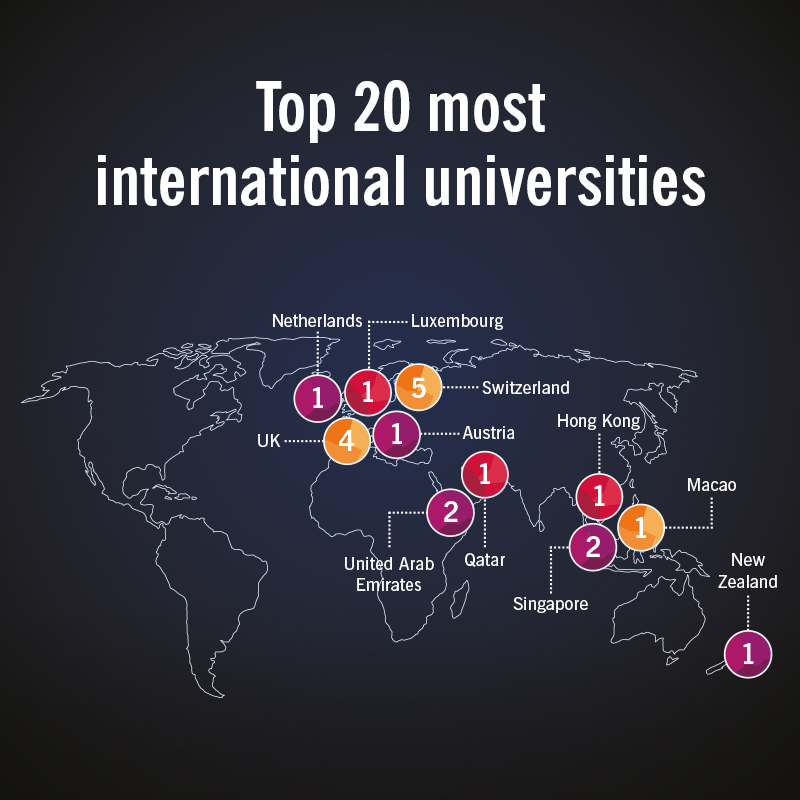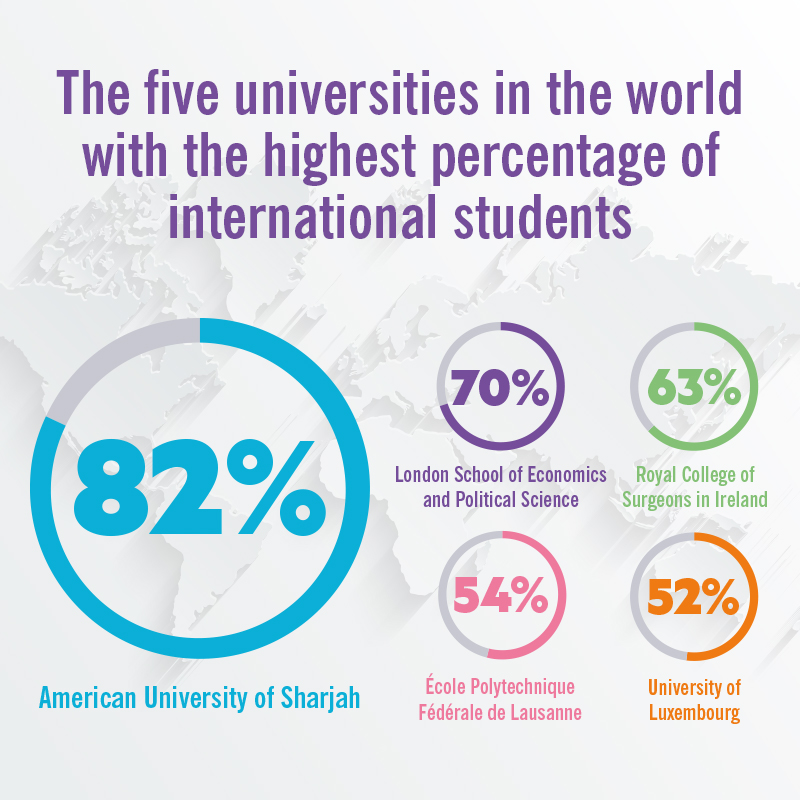World’s most international universities: the student experience
The world’s most international universities have been revealed – but what impact does an international environment have on students?
- Rankings
- Rankings for Students
- Student life
- Study abroad
Share
�й�AƬ
For students looking for an international experience abroad or at home, Switzerland, Luxembourg, Hong Kong or even Qatar might be the best bet.
Times �й�AƬ has released its ranking of the world’s most international universities, and these countries are home to the five universities with the highest scores.
University of Geneva, both in the top five.
- See the best ��universities in the Netherlands

��
Ashley Pilipiszyn, a master’s student at the University of Geneva and originally from the US, said: “The transition from Chicago and Boston was not a difficult task. In the classroom, I was in a multicultural surrounding, connecting with students from different backgrounds, which enhances the overall academic experience.”
Read more about Ashley’s experience in her blog.
The score for most international universities is predominantly calculated from the proportion of international students and staff, both of whom can have a direct impact on international students’ experience.
Heidi Flinkman, an undergraduate from Finland who is studying at the University of Luxembourg, explained: “As the university is highly international, there are students and staff from many different countries and linguistic backgrounds, so it is easy to feel at home.
“My teachers, often teaching in something other than their first language as well, have been encouraging and sometimes offer me alternative course material or an option to answer in English in the exam.”
Find out about international study at the University of Luxembourg in Heidi’s blog.
The most international universities are, perhaps unsurprisingly, concentrated in Europe; more than half of the top 20 are in Europe, and 128 universities of the top 200 are in Europe.
As Heidi comments, students in Luxembourg, and indeed elsewhere in mainland Europe, benefit from being so close to many other countries and living in multicultural cities.
Although only 17 Asian universities feature in the top 200 international universities, seven of these make it into the top 20.
Hong Kong and Singapore are well known as internationally connected locations, and their universities also promote a globalised environment, as evidenced in the international ranking.
��
Vesta Eresta Jaya, from Indonesia, is studying for a bachelor’s degree at the University of Hong Kong, ranked as the third most international university in the world.
She said: “I am always exposed to students from different backgrounds, which allows for cultural exchange, and I learn from my peers about the fascinating projects that they are currently working on.”
Hear more from Vesta in her blog here.

��
London is the world’s number one city for international universities, with more top 200 institutions than the US, Canada and France combined.
American University of Sharjah, United Arab Emirates.
Craig Calhoun, LSE’s director, said: “An LSE education is remarkable preparation for global careers and citizenship of an interconnected world precisely because students from 155 or more countries learn together.
“Whether a class discusses finance, law or international relations, students from Africa and Asia, North and South America, continental Europe and the UK bring different perspectives and ask different questions. Everyone benefits. And after graduation, everyone has connections to alumni around the world.”
Boris Johnson, the mayor of London, commented: “London not only has the greatest concentration of top class universities of any city in the world, it is also the most diverse and welcoming. At the cutting edge of innovation and creativity, and with its unique cultural richness, London continues to have unrivalled international appeal, attracting the brightest academic and student brains on the planet.”
See the full top 200 of the world’s most international universities here.��
The top 20 most international universities
|
Rank |
Institution |
Country |
International Outlook |
World University Rank 2016 |
% International students |
|
1 |
Qatar |
99.9 |
601–800 |
42% |
|
|
2 |
Luxembourg |
99.8 |
=193 |
52% |
|
|
3 |
Hong Kong |
99.5 |
=44 |
38% |
|
|
4 |
École Polytechnique Fédérale de Lausanne |
Switzerland |
98.6 |
31 |
54% |
|
5 |
Switzerland |
98.5 |
=131 |
39% |
|
|
6 |
China |
98.4 |
401–500 |
31% |
|
|
7 |
ETH Zurich – Swiss Federal Institute of Technology Zurich |
Switzerland |
97.9 |
9 |
37% |
|
8 |
Switzerland |
97.6 |
351–400 |
34% |
|
|
9 |
Singapore |
96.2 |
26 |
34% |
|
|
10 |
UK |
96.0 |
8 |
51% |
|
|
11 |
Austria |
95.7 |
301–350 |
39% |
|
|
12 |
New Zealand |
95.6 |
601–800 |
38% |
|
|
12 |
American University of Sharjah |
United Arab Emirates |
95.6 |
601–800 |
82% |
|
14 |
Netherlands |
95.5 |
=88 |
48% |
|
|
15 |
United Arab Emirates |
95.0 |
501–600 |
26% |
|
|
16 |
Switzerland |
94.7 |
=101 |
24% |
|
|
17 |
Singapore |
94.6 |
55 |
33% |
|
|
18 |
UK |
94.4 |
2 |
34% |
|
|
18 |
UK |
94.4 |
14 |
46% |
|
|
20 |
UK |
93.8 |
27 |
37% |
